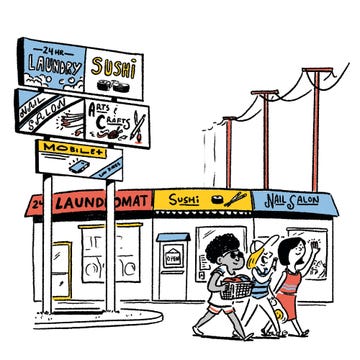Elizabeth Diller
Cofounder and partner, Diller Scofidio + Renfro, New York, New York
When we started designing the Broad museum in downtown L.A., it was hard not to respond at least in some way to Walt Disney Concert Hall. It was such an icon and practically next door. In comparison, we had a smaller footprint as well as a limited building height. Our project had to fit into a box. So we tried to make the most out of that box and begin a playful dialogue with the concert hall to the north. Where Disney Hall was shiny and gleaming, the Broad would be absorbent, like a sponge. There was a kind of gesture, an offering. We wanted to blow a kiss across the street, and we made it pucker.
This roundup appears in Issue 33 of Alta Journal.
SUBSCRIBE
Daniel Libeskind
Founder, Studio Libeskind, New York, New York
I use the traditional method for designing: drawing and some modest models. It’s just watercolors and paper, which is similar, I think, to Frank’s process. We’ve seen a lot of à la Frank buildings by architects who have taken the style of his work and then used the computer to generate curvilinear and complex forms, but you can really see the hollowness—the banality of these forms. They’re computer-generated nothings compared with Frank’s work, which really has a true sculptural integrity. Frank is a true artist. His projects don’t accept anything surface-level. There’s a spark of rebellion.
Eric Owen Moss
Principal and lead designer, Eric Owen Moss Architects, Culver City, California
I think what’s so convincing about Frank is that he’s able to mitigate—but still acknowledge—the conventional commercial constraints of architecture to make special, spectacular, investigatory things. Great architecture possesses a quality of curiosity. The wonder and the care that belongs to Frank’s work, I think, has forever been the essence of his repertoire. There’s this sort of “outside the box” crap that architects always talk about. I think for Frank, and I think for me, too, when you’re outside the box, there’s always another box. So to that, I’d say, “You’re not outside the box. You’re free.”
Lorcan O’Herlihy
Founding principal and creative director, Lorcan O’Herlihy Architects, Los Angeles, California, and Detroit, Michigan
Gehry is known for his museums and cultural projects, but there’s an aspect of his work where he embraces the culture of Los Angeles—a place that allows you to apply different strategies that are not acceptable in other cities. In Los Angeles, you don’t have the burdens of Boston or San Francisco—two cities that defer to already-established design principles. I was always intrigued by Gehry’s earlier work—the Ron Davis home and studio and his own Santa Monica house. These houses are wonderful in their use of raw, off-the-shelf material. Gehry incorporated materials in a very unique way—using the opportunity to take the ordinary and make it extraordinary.
Dana McKinney White
Assistant professor of urban design, Harvard University, Cambridge, Massachusetts
When I was put on the Gehry Partners team to develop the master plan for the Los Angeles River, my role was part urban planner and part architect. But also, my job was almost a social consciousness for the office, making sure that we were doing things in a way that resonated with the local community. We were trying to propel a new vision for the river, not from the top down but from the bottom up. Frank is extraordinarily socially minded. When the draft of the master plan was done, I moved back to the East Coast. My now-husband and I had been doing long distance for three years, and I was ready to not do that anymore. When I called Frank to tell him, he was teary-eyed. But he remained supportive, and he very much understood.•
Ed Leibowitz wrote about how performance venues were surviving during the pandemic for Alta Journal 15.






















